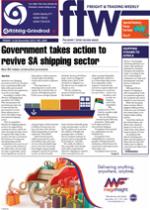The Air Cargo Operators’
Committee (Acoc) is
taking a serious stance
on the worrying issue
of declaration, or worse
the non-declaration,
of dangerous cargoes,
according to chairman
Alwyn Rautenbach, MD of
Airlink Cargo.
“We plan to work
with the Civil Aviation
Authority (CAA) dangerous
goods section from the
beginning of next year to
make everyone aware of
dangerous goods and the
major problem of
non-declaration,” he told
FTW.
The big problem is
that a lot of people in the
airfreight industry are
fooled by the apparent
innocuous appearance
of goods which are, in
fact, extremely dangerous.
Items like lead acid and
lithium-ion batteries,
which are widely used in
products such as portable
consumer electronic
devices and spray cans
of hairspray and oven
cleaner, for example, are
items which innocently
sit around in people’s
houses, but which can
have serious consequences
when transported by air,
according to Rautenbach.
“What we are looking for
is compulsory screening of
goods,” said Rautenbach,
“particularly those being
handed in by ‘regulated
agents’ and ‘known
consignors’ as ‘known
cargo’, cargoes that are less
strictly dealt with than
cargoes from unknown
parties.
“The idea of this is to
heighten awareness of just
what constitutes dangerous
goods and to stress the
need for declaration of
these items.”
The Part 108 security
regulations are not
just aimed at terrorist
activities, he added, but at
the possibly mistaken habit
of not declaring what are
indeed dangerous goods by
those who should be aware
of them.
Call for tough stand on air cargo screening
13 Dec 2013 - by Alan Peat
0 Comments
FTW - 13 Dec 13

13 Dec 2013
13 Dec 2013
13 Dec 2013
13 Dec 2013
13 Dec 2013
13 Dec 2013
13 Dec 2013
13 Dec 2013
13 Dec 2013
13 Dec 2013
13 Dec 2013
